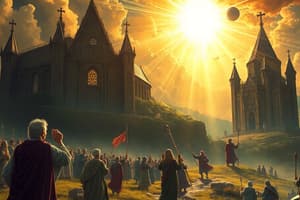Podcast
Questions and Answers
What characterized the primary theological dynamic in the 18th-century British evangelical revival?
What characterized the primary theological dynamic in the 18th-century British evangelical revival?
- Arminian Perfectionism
- Anglican Orthodoxy
- Calvinist Methodism (correct)
- Hyper-Calvinist Baptists
George Whitefield is most closely associated with which theological perspective?
George Whitefield is most closely associated with which theological perspective?
- Calvinistic Evangelicalism (correct)
- High Church Anglicanism
- Arminianism
- Roman Catholic doctrine
What distinguished the Particular Baptists?
What distinguished the Particular Baptists?
- Methodist polity
- Particular redemption (correct)
- Universal grace
- Arminian theology
The Welsh Revival was particularly influenced by which theological movement?
The Welsh Revival was particularly influenced by which theological movement?
What did the First Great Awakening primarily focus on?
What did the First Great Awakening primarily focus on?
The Marrow Controversy in Scotland mainly dealt with which issue?
The Marrow Controversy in Scotland mainly dealt with which issue?
Which theological approach is most similar to Charles Finney's methodology?
Which theological approach is most similar to Charles Finney's methodology?
What was a feature of the Kentucky camp meetings?
What was a feature of the Kentucky camp meetings?
What is the main aspect of Whitefield's relationship with Wesley?
What is the main aspect of Whitefield's relationship with Wesley?
How did Hyper-Calvinism affect Baptist evangelism?
How did Hyper-Calvinism affect Baptist evangelism?
Which individual is primarily associated with the doctrine of Christian Perfectionism?
Which individual is primarily associated with the doctrine of Christian Perfectionism?
What characterized the Second Great Awakening?
What characterized the Second Great Awakening?
What was Griffith Jones' main contribution to Welsh religious life?
What was Griffith Jones' main contribution to Welsh religious life?
Which individual is known for evangelical preaching in Virginia?
Which individual is known for evangelical preaching in Virginia?
The Scottish revival was significantly affected by which factor?
The Scottish revival was significantly affected by which factor?
Which theological perspective did Andrew Fuller challenge?
Which theological perspective did Andrew Fuller challenge?
What characterized the 1857-58 Revival?
What characterized the 1857-58 Revival?
Which church was significant in Southern evangelical expansion?
Which church was significant in Southern evangelical expansion?
Flashcards
18th-Century British Evangelical Revival
18th-Century British Evangelical Revival
A theological movement emphasizing individual experience and personal piety, prominent in 18th-century Britain, marked by emotional preaching and a focus on personal salvation.
Arminianism
Arminianism
A theological perspective emphasizing free will, God's universal love, and the possibility of achieving sinless perfection.
Particular Redemption
Particular Redemption
A theological doctrine emphasizing that Christ died only for the elect (chosen people) and that predestination determines salvation.
Welsh Revival
Welsh Revival
Signup and view all the flashcards
Second Great Awakening
Second Great Awakening
Signup and view all the flashcards
Marrow Controversy
Marrow Controversy
Signup and view all the flashcards
Charles Finney's Theology
Charles Finney's Theology
Signup and view all the flashcards
Charles Finney
Charles Finney
Signup and view all the flashcards
Hyper-Calvinism
Hyper-Calvinism
Signup and view all the flashcards
The Second Great Awakening
The Second Great Awakening
Signup and view all the flashcards
Griffith Jones
Griffith Jones
Signup and view all the flashcards
Patronage Act Controversies
Patronage Act Controversies
Signup and view all the flashcards
Samuel Davies
Samuel Davies
Signup and view all the flashcards
Sandy Creek Baptist Church
Sandy Creek Baptist Church
Signup and view all the flashcards
Jonathan Edwards
Jonathan Edwards
Signup and view all the flashcards
Countess of Huntingdon
Countess of Huntingdon
Signup and view all the flashcards
Andrew Fuller
Andrew Fuller
Signup and view all the flashcards
Howell Harris
Howell Harris
Signup and view all the flashcards
Study Notes
18th-Century Evangelical Revival & Related Movements
- Theological Movements: Key theological shifts in the 18th-century British evangelical revival included Calvinist Methodism, Arminian Perfectionism, and Anglican Orthodoxy. Particular Baptists focused on particular redemption, while others held different views.
- Key Figures: George Whitefield championed Calvinistic Evangelicalism, while John Wesley promoted Arminianism and Christian Perfectionism. Charles Finney's approach differed significantly.
- The First Great Awakening: Primarily concentrated in the Middle Colonies, this awakening saw increased religious fervor in the American colonies.
- The Welsh Revival: Marked by Calvinistic Methodist influences and the work of Griffith Jones.
- Scottish Revival: Influenced by controversies and significant changes in the Scottish Church and its relationship with other denominations.
- The Marrow Controversy: Focused on the relationship between the law and the Gospel.
- New Haven Theology: Associated with theological modifications and a significant divergence from traditional views. Timothy Dwight and Nathaniel William Taylor were among the key figures.
- New Measures: Charles Finney's techniques included strategies like the anxious bench and protracted meetings.
Specific Denominations & Figures
- Particular Baptists: Distinguished by their belief in particular redemption, they faced challenges in early 18th-century England.
- George Whitefield: Primarily associated with Calvinistic Evangelicalism. His relationship with John Wesley was complex, involving both cooperation and disagreement.
- John Wesley: Advocated for Arminianism and Christian Perfectionism. His theological positions sparked debate.
- Charles Finney: His "New Measures" evangelistic strategies were influential.
- Jonathan Edwards: A key figure in New England Congregationalism.
- Griffith Jones: Known for the Circulating Charity Schools that greatly impacted Welsh religious life.
- Andrew Fuller: Contributed to Baptist theology by challenging Hyper-Calvinism.
- Howell Harris: A prominent figure in the Welsh Methodist movement.
- Countess of Huntingdon: Founded chapels and supported evangelical movements in 18th-century England.
Great Awakenings
- Second Great Awakening: Characterized by diversity rather than uniformity of approach in the American colonies.
General Characteristics of Movements
- Emotionalism: Characterized many revivalist gatherings and events as people frequently engaged with emotions outwardly.
- Methodological Innovations: Key figures like Charles Finney introduced new techniques in evangelism.
- Theological Controversies: The differences and disagreements between different denominations like Particular Baptists and those holding diverse views on religious doctrine played a role in the events of the era.
- Revival movements in different regions: Differences and comparisons amongst the revival movements in Wales, Scotland, and the American Colonies were significant.
- Decline of Particular Baptists: Certain factors, like the evolving nature of denominational views and internal conflicts, can be identified as reasons for a decline in particular Baptist churches.
Specific Question Answers (Multiple Choice)
- Most questions relate to the figures, movements, and distinctions that arose during the 18th-century evangelical revival.
- Understanding these specifics will help clarify the context associated with different parts of this period.
Open-Ended Questions (Focus Area Analysis)
- Analyze the historical and theological ramifications of the 18th-century evangelical revival. (The following questions explore many of these same factors)
Studying That Suits You
Use AI to generate personalized quizzes and flashcards to suit your learning preferences.




